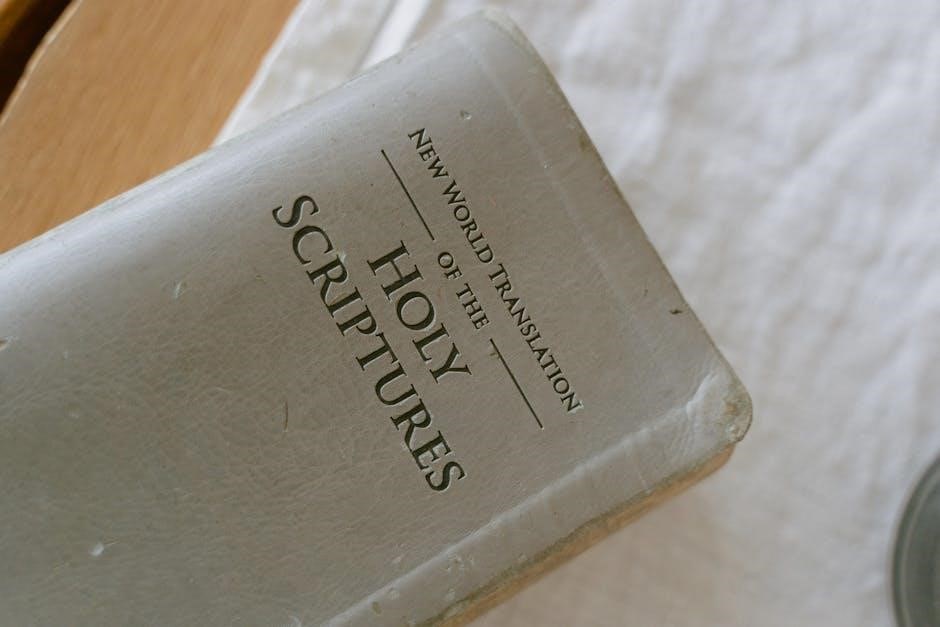This section introduces the study guide for C.S. Lewis’s Mere Christianity, offering insights into its structure and purpose. It helps readers engage deeply with the book’s themes, fostering reflection and understanding through thought-provoking questions. Designed for both new and experienced readers, the guide enhances comprehension of Lewis’s arguments and their relevance to faith and modern life.
1.1 Overview of C.S. Lewis and Mere Christianity
C.S. Lewis, a renowned British author and scholar, is best known for works like Mere Christianity and The Chronicles of Narnia. Born in 1898, Lewis was a prominent Christian apologist whose writings bridge faith and reason. Mere Christianity, originally delivered as BBC radio talks during WWII, explores foundational Christian teachings. The book is celebrated for its clear, logical presentation of faith, making it accessible to a broad audience. This study guide complements the text, offering questions to deepen understanding of Lewis’s arguments and their relevance to modern life. It is a valuable resource for both new and experienced readers of Lewis’s work.
1.2 Importance of Study Guide Questions for Understanding
Study guide questions are essential for fostering a deeper understanding of Mere Christianity. They encourage readers to engage actively with the text, exploring key themes such as morality, faith, and the nature of God. By prompting reflection and analysis, these questions help readers clarify Lewis’s arguments and apply them to real-life situations. They also facilitate group discussions, making them a valuable tool for both individual and communal study. The structured approach of the guide ensures that readers grasp the book’s core ideas and their enduring relevance in contemporary conversations about spirituality and ethics. This enhances both personal and shared learning experiences.
1.3 Background on the Book’s Relevance and Popularity
Mere Christianity remains a timeless and influential work due to its universal appeal and clear articulation of Christian doctrine. Originally delivered as radio broadcasts during World War II, the book provided a moral and spiritual foundation for listeners seeking hope and clarity. Its relevance endures as it addresses fundamental questions about faith, morality, and the human condition. The book’s popularity stems from its ability to transcend denominational boundaries, offering a unifying perspective on Christianity. Study guides further enhance its accessibility, helping readers engage with Lewis’s profound ideas and apply them to contemporary life, ensuring the book’s enduring impact and widespread appreciation.

Key Themes in Mere Christianity
Mere Christianity explores morality, the problem of pain, the Trinity, and the interplay of faith and reason. These themes address human nature, divine purpose, and ethical principles, making the book a foundational text for Christian thought and apologetics.
2.1 The Moral Argument for God
C.S. Lewis’s moral argument for God posits that universal moral laws exist, transcending cultural and personal variations. He argues that these objective moral standards imply the existence of a divine source. Lewis contends that humanity’s inherent sense of right and wrong reflects a higher moral authority, which he identifies as God. This reasoning is central to his case for Christianity, suggesting that moral truths are not human inventions but divine realities. By appealing to common moral experiences, Lewis bridges philosophy and theology, offering a compelling foundation for belief in a moral, personal God.
2.2 The Problem of Pain and Suffering
C.S. Lewis addresses the problem of pain and suffering, acknowledging it as a significant challenge to belief in a loving God. He argues that human freedom, essential for genuine love and morality, inevitably leads to the possibility of evil and suffering. Lewis suggests that suffering can serve a greater purpose, fostering spiritual growth, humility, and a deeper understanding of God’s love. He emphasizes that pain, though difficult, can lead to moral and spiritual development, aligning with the Christian narrative of redemption through sacrifice. This perspective offers a theological framework for understanding suffering within the context of divine love and purpose.
2.3 The Concept of the Trinity
C.S. Lewis explores the Trinity as a central Christian doctrine, describing it as a relationship of three divine persons—Father, Son, and Holy Spirit—united in one essence. He uses analogies like a three-dimensional being to illustrate this mystery, emphasizing that the Trinity is not a contradiction but a profound truth. Lewis argues that the Trinity reflects the unity and diversity within God, providing a framework for understanding divine love and human relationships; He stresses that this doctrine, while complex, is essential for grasping the nature of God and humanity’s spiritual journey, as revealed through Christ and the Holy Spirit.
2.4 The Role of Faith and Reason
C.S. Lewis emphasizes the complementary relationship between faith and reason in Christianity. He argues that faith is not opposed to reason but rather builds upon it, as reason helps establish the foundation for belief. Lewis rejects the idea of “blind faith,” asserting that Christian teachings are rooted in logical and historical truths. He encourages believers to engage their intellects to deepen their faith, showing that reason and faith work together to lead individuals to a fuller understanding of God. This balance is central to his apologetic approach, bridging the gap between rational inquiry and spiritual commitment.

Study Guide Questions for Each Book
This section provides detailed questions for each book in Mere Christianity, helping readers analyze key concepts, themes, and arguments presented by C.S. Lewis.
3.1 Book 1: The Moral Law
Book 1 of Mere Christianity explores the concept of the Moral Law, a universal sense of right and wrong shared by all humans. Lewis argues this law points to a higher authority beyond human invention. Questions in this section delve into the nature of morality, its universality, and its implications for understanding God’s existence. Readers are prompted to reflect on how the Moral Law influences human behavior and decision-making, fostering a deeper connection between ethics and faith. These questions encourage critical thinking about the origins of morality and its significance in a Christian worldview.
3.2 Book 2: What Christians Believe
Book 2 of Mere Christianity delves into the foundational beliefs of Christianity, including the nature of God, the role of Jesus Christ, and the concept of the Trinity. Lewis addresses common questions and objections to these doctrines, offering clear explanations for their logic and relevance. Study guide questions in this section encourage readers to explore the core tenets of Christianity, fostering a deeper understanding of its teachings and their implications for faith. By examining these beliefs, readers are prompted to critically think about the essence of Christianity and its application to their personal lives and spiritual journeys.
3.3 Book 3: Christian Behaviour
Book 3 of Mere Christianity focuses on how Christian beliefs translate into ethical living. Lewis explores moral principles such as honesty, humility, and forgiveness, offering practical advice on living a virtuous life. Study guide questions in this section help readers reflect on the application of these teachings in everyday situations. By examining the moral dimensions of Christian behaviour, readers are challenged to consider how their actions align with their faith. This section encourages personal growth and a deeper understanding of the moral framework that guides Christian living, emphasizing the importance of living out one’s beliefs in tangible ways.
3.4 Book 4: Beyond Personality
Book 4 of Mere Christianity delves into the deeper theological aspects of Christianity, particularly the nature of God and the Trinity. Lewis challenges readers to move beyond a simplistic view of God as a distant figure, instead emphasizing the relational and personal aspects of the divine. Study guide questions in this section encourage exploration of the Trinity and its implications for faith. By examining the interplay between the Father, Son, and Holy Spirit, readers gain a richer understanding of God’s character and how it shapes Christian theology. This section invites reflection on the profound mystery of God’s nature and its relevance to personal belief.

Theological and Philosophical Discussions
This section explores theological and philosophical debates, examining the divine nature, human condition, morality, and the interplay between faith and reason central to Lewis’s arguments.
4.1 The Nature of God and Humanity
This section delves into C.S. Lewis’s exploration of the divine and human relationship, emphasizing the moral law as evidence of God’s existence. Lewis argues that humanity’s inherent sense of right and wrong reflects a higher authority, suggesting God’s nature is both personal and transcendent. He also examines the Trinity, describing God as three-in-one, and discusses human fallenness and redemption. Lewis asserts that humans, though flawed, are capable of moral growth and divine connection. These discussions form the theological foundation for understanding Christianity’s core beliefs and humanity’s spiritual potential, bridging philosophy and faith in a way that remains relevant today.
4.2 The Relationship Between Religion and Science
C.S. Lewis addresses the intersection of religion and science, arguing that they are not inherently in conflict but rather complementary ways of understanding the world. He suggests that Christianity provides a rational framework for science to operate within, as it posits an orderly, intelligible universe created by a logical God. Lewis emphasizes that science explores the “how” of creation, while religion delves into the “why,” offering ultimate meaning and purpose. He critiques a purely materialistic view of the world, asserting that Christianity’s supernatural perspective better explains human experiences and the universe’s complexity, fostering a harmonious coexistence between faith and reason.
4.3 The Idea of Sacrificial Love
C.S. Lewis explores the concept of sacrificial love as a central tenet of Christianity, emphasizing its transformative power. He argues that true love, rooted in selflessness, mirrors God’s sacrificial nature, as seen in Christ’s crucifixion. Lewis distinguishes this from romantic or sentimental love, highlighting its redemptive quality. He asserts that sacrificial love is not merely a duty but a reflection of divine grace, enabling humans to transcend self-interest and embody Christ-like compassion. This idea is pivotal in understanding Christian ethics and relationships, as Lewis calls believers to embrace sacrifice as a means of expressing love and drawing closer to God.
4.4 The Role of the Church in Modern Society
C.S. Lewis discusses the Church’s vital role in modern society, emphasizing its function as a moral compass and spiritual guide. He argues that the Church must balance tradition with contemporary relevance, addressing societal issues while maintaining its core teachings. Lewis stresses the importance of community and collective worship, asserting that the Church fosters unity and accountability among believers. He also highlights the Church’s role in preserving Christian doctrine amidst cultural shifts, ensuring that it remains a steadfast source of truth and grace. Lewis’s vision of the Church as a transformative force in society underscores its enduring significance in guiding individuals toward God.

Ethical and Moral Questions
C.S. Lewis explores ethical dilemmas, emphasizing morality as a reflection of divine intent. He argues that right and wrong are universal, rooted in human nature and God’s design.
5.1 The Concept of Right and Wrong
C.S. Lewis argues that the concept of right and wrong is universal, rooted in human nature. He contends that moral instincts are inherent, not invented, suggesting a divine source. In Mere Christianity, Lewis uses the moral law to argue for God’s existence, asserting that moral truths imply a higher authority. He distinguishes between moral values and cultural norms, emphasizing that genuine morality transcends human invention. This section challenges readers to reflect on the foundation of morality and its implications for belief and behavior, aligning with Lewis’s broader apologetic for Christianity.
5.2 The Importance of Forgiveness
In Mere Christianity, C.S. Lewis emphasizes forgiveness as a divine act reflecting God’s nature. He argues that true forgiveness is not merely emotional but a deliberate choice to release others from their debts. Lewis ties forgiveness to repentance, stressing that both are essential for healing relationships. He critiques the idea of conditional forgiveness, advocating instead for unconditional pardon as modeled by Christ. Forgiveness, Lewis suggests, liberates both the forgiver and the forgiven, fostering reconciliation and spiritual growth. This theme is central to Christian ethics, urging believers to mirror God’s mercy in their interactions, fostering a culture of grace and restoration.
5.3 The Role of Self-Denial in Christianity
In Mere Christianity, C.S. Lewis highlights self-denial as a cornerstone of Christian living, emphasizing its transformative power. He argues that true self-denial involves surrendering one’s will to God, not merely suppressing desires. Lewis warns against misunderstanding self-denial as self-mortification or prideful asceticism. Instead, it is about aligning one’s life with divine purposes, fostering humility and dependence on God. This concept challenges believers to prioritize spiritual growth over worldly comforts, reflecting Christ’s example of sacrificial love. Study questions explore how self-denial leads to freedom, joy, and a deeper relationship with God, countering the misconception that it diminishes human fulfillment.
5.4 The Ethical Implications of Christian Doctrine
C.S. Lewis’s Mere Christianity explores the ethical implications of Christian doctrine, emphasizing the moral responsibilities that flow from belief in God. Lewis argues that recognizing a universal moral law points to a divine source, shaping human actions and decisions. He underscores the importance of virtues like humility, selflessness, and forgiveness, which align with Christ’s teachings. Study questions in this section invite readers to reflect on how Christian ethics influence personal and societal behavior, encouraging a life of integrity and compassion. Lewis’s insights challenge believers to embody their faith in practical ways, demonstrating its relevance to modern moral dilemmas.

The Impact of Mere Christianity
Mere Christianity has profoundly shaped Christian thought, influencing apologetics, personal conversions, and cultural dialogue. Its timeless insights continue to inspire reflection and debate, ensuring its enduring relevance.
6.1 Influence on Christian Apologetics
C.S. Lewis’s Mere Christianity has profoundly shaped Christian apologetics, offering logical and accessible arguments for the faith. Lewis’s ability to articulate complex theological concepts in a relatable manner has made the book a cornerstone for defenders of Christianity. His exploration of the moral law, the problem of pain, and the Trinity provides a robust framework for addressing skeptics. The book’s influence is evident in its widespread use in apologetic discussions, helping to bridge the gap between faith and reason. Its clarity and depth have made it a vital resource for both scholars and laypeople, ensuring its enduring impact on Christian thought and discourse.
6.2 Role in Personal Conversions
C.S. Lewis’s Mere Christianity has played a significant role in the personal conversions of many individuals. Its clear and reasoned arguments have helped countless people move from skepticism to faith. Lewis’s ability to address common objections and present Christianity as a logical and compelling worldview has resonated deeply with readers. Many have credited the book with helping them understand and embrace the Christian faith, often serving as a catalyst for their spiritual journeys. Its influence extends beyond intellectual assent, fostering a heartfelt commitment to Christianity in those who engage with its timeless truths.
6.3 Cultural and Historical Significance
Mere Christianity holds profound cultural and historical significance, transcending its role as a theological text. Originally broadcast as radio talks during World War II, it provided moral and spiritual guidance to a nation in crisis. Its clear, accessible language made complex Christian doctrines understandable to a broad audience, shaping modern Christian thought and apologetics. The book has been translated into numerous languages, reaching millions worldwide. Its influence extends beyond academia, impacting popular culture and personal faith journeys. As a bridge between traditional Christianity and contemporary society, Mere Christianity remains a cornerstone of 20th-century religious literature, continuing to inspire and challenge readers today.
6.4 Criticisms and Controversies
While Mere Christianity is widely acclaimed, it has faced criticism for its theological and philosophical perspectives. Some argue that Lewis oversimplifies complex doctrines, such as the Trinity, to make them more accessible. Others critique his moral arguments as lacking philosophical rigor. Additionally, his views on exclusivity in Christianity and the concept of hell have sparked debates. Critics also challenge his approach to faith and reason, arguing that it may not fully address modern skepticism. Despite these criticisms, the book remains influential, with its clear, engaging style continuing to resonate with many readers seeking foundational Christian teachings.

Additional Resources for Study
Explore recommended books, online forums, and video resources to deepen your understanding of Mere Christianity. Join discussion groups for shared insights and further engagement with the text.
7.1 Recommended Secondary Readings
Supplement your study with classic works like The Screwtape Letters and The Problem of Pain by C.S. Lewis. Explore The C.S. Lewis Bible for meditations paired with biblical passages. For deeper insights, consider study guides like Mere Christianity Study Guide by Dr. Joseph McRae Mellichamp. Engage with video discussions and audio resources that analyze Lewis’s arguments. These materials provide diverse perspectives and enrich your understanding of the book’s themes, such as morality, faith, and reason. Join online forums and communities to share insights and gain new perspectives from fellow readers and scholars.
7.2 Online Study Guides and Forums
Explore online resources like the official C.S. Lewis website and platforms such as BibleStudyTools for comprehensive study guides. Websites like CSLewis.com offer detailed analyses and discussion questions. Join forums like Reddit’s r/CSLewis or Facebook groups dedicated to Mere Christianity for interactive discussions. Many online communities provide video study guides and host live Q&A sessions. These platforms allow you to engage with others, share insights, and gain new perspectives. Utilize these tools to enhance your understanding and deepen your engagement with Lewis’s work in a collaborative and dynamic environment. They are invaluable for both individual and group study settings.
7.3 Video and Audio Resources
Enhance your study of Mere Christianity with video and audio resources available online. Platforms like YouTube offer video studies and lectures by scholars analyzing the book. Podcasts such as The C.S. Lewis Podcast and All About Jack provide in-depth discussions. Audiobook versions of the study guide are also available on platforms like Audible and Scribd. These resources offer unique perspectives, helping to clarify complex concepts and themes. They are ideal for auditory learners or those seeking to supplement their reading with expert insights. Utilize these tools to gain a deeper understanding of Lewis’s arguments and their application to modern life.
7.4 Discussion Groups and Communities
Engage with others through online forums and communities dedicated to Mere Christianity study guides. Websites like Facebook groups, Reddit forums, and specialized Christian discussion boards offer spaces to share insights, ask questions, and learn from others. Local churches and book clubs often host in-person or virtual discussions, fostering a collaborative learning environment. These communities provide valuable perspectives, helping to deepen your understanding of Lewis’s arguments. Participating in discussions allows you to explore complex themes, gain new insights, and connect with fellow readers. Such groups are an invaluable resource for those seeking to enrich their study of Mere Christianity.
Mere Christianity remains a timeless resource for understanding Christian foundational truths. This study guide offers profound insights, encouraging readers to reflect deeply and apply Lewis’s teachings to their lives.
8.1 Summarizing Key Takeaways
C.S. Lewis’s Mere Christianity provides a compelling case for Christian belief, emphasizing universal moral law, the nature of God, and the balance between faith and reason. Through the study guide, readers explore themes like the Trinity, sacrificial love, and ethical living. Lewis’s arguments appeal to both intellect and emotion, offering practical insights for modern life. The guide’s questions encourage critical thinking and personal reflection, helping readers grasp the book’s relevance and apply its teachings. Ultimately, Mere Christianity challenges individuals to deepen their faith and live out their beliefs with integrity and purpose in an ever-changing world.

8.2 Encouragement for Further Study
Exploring Mere Christianity opens doors to deeper spiritual and intellectual growth. Readers are encouraged to delve into additional resources, such as C.S. Lewis’s other works, theological texts, and online forums, to broaden their understanding. Engaging with study groups or discussion communities can foster meaningful conversations and insights. Further study allows individuals to grapple with complex questions, reinforcing their faith and applying its teachings to everyday life. Embracing lifelong learning enriches one’s spiritual journey, helping to navigate modern challenges with clarity and purpose, as Lewis’s timeless wisdom continues to inspire and guide seekers of truth.
8.3 The Ongoing Relevance of Mere Christianity
C.S. Lewis’s Mere Christianity remains a timeless and universal guide for spiritual seekers. Its exploration of faith, morality, and reason continues to resonate across generations and cultures. The book’s themes—such as the moral law, the problem of pain, and the nature of God—address fundamental human questions that are as relevant today as they were during its writing; Lewis’s clear, accessible arguments make complex theological concepts understandable, offering a bridge between faith and intellect. As society evolves, Mere Christianity provides enduring wisdom, helping readers navigate modern dilemmas and deepen their understanding of Christianity’s core teachings.


